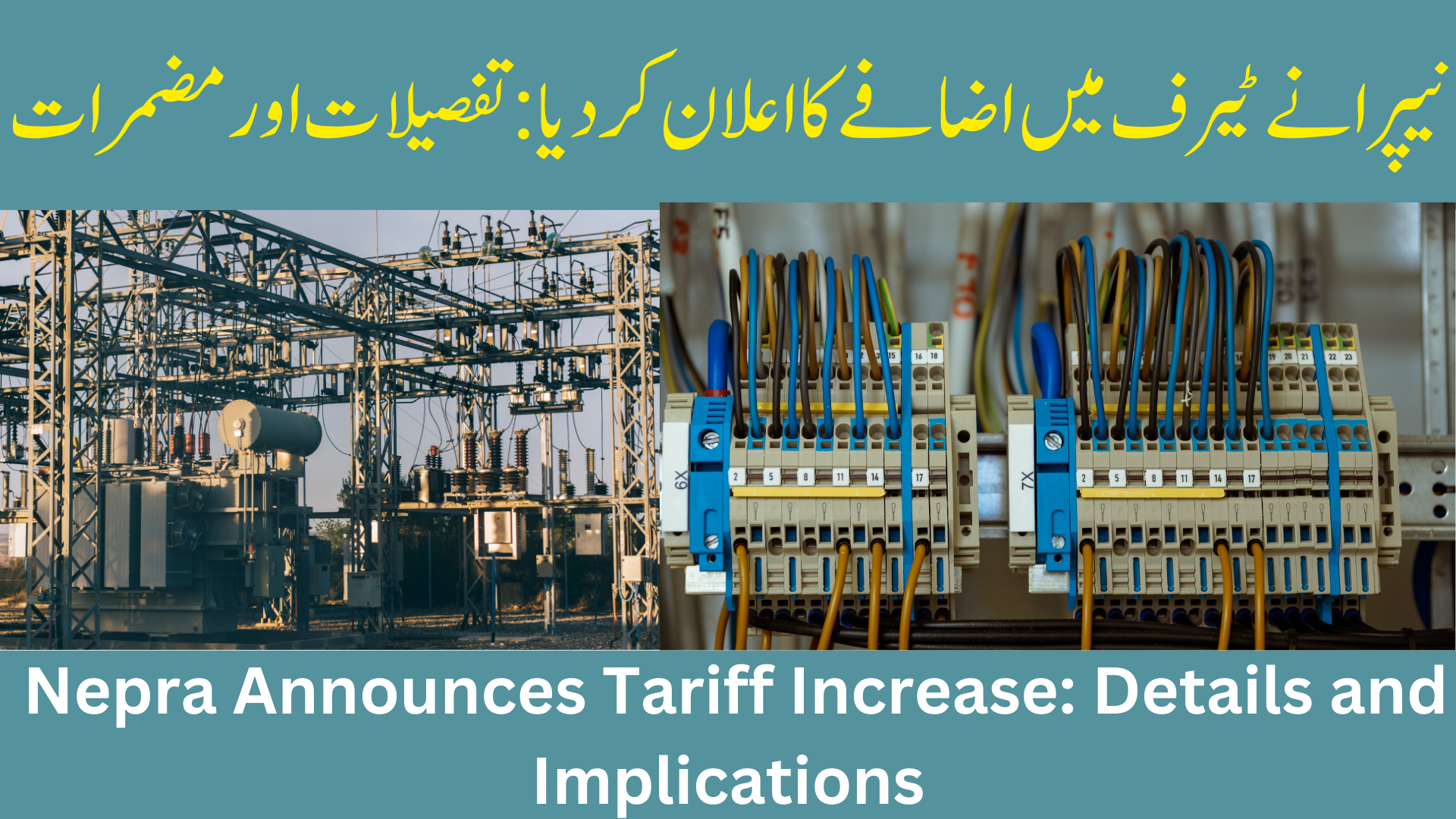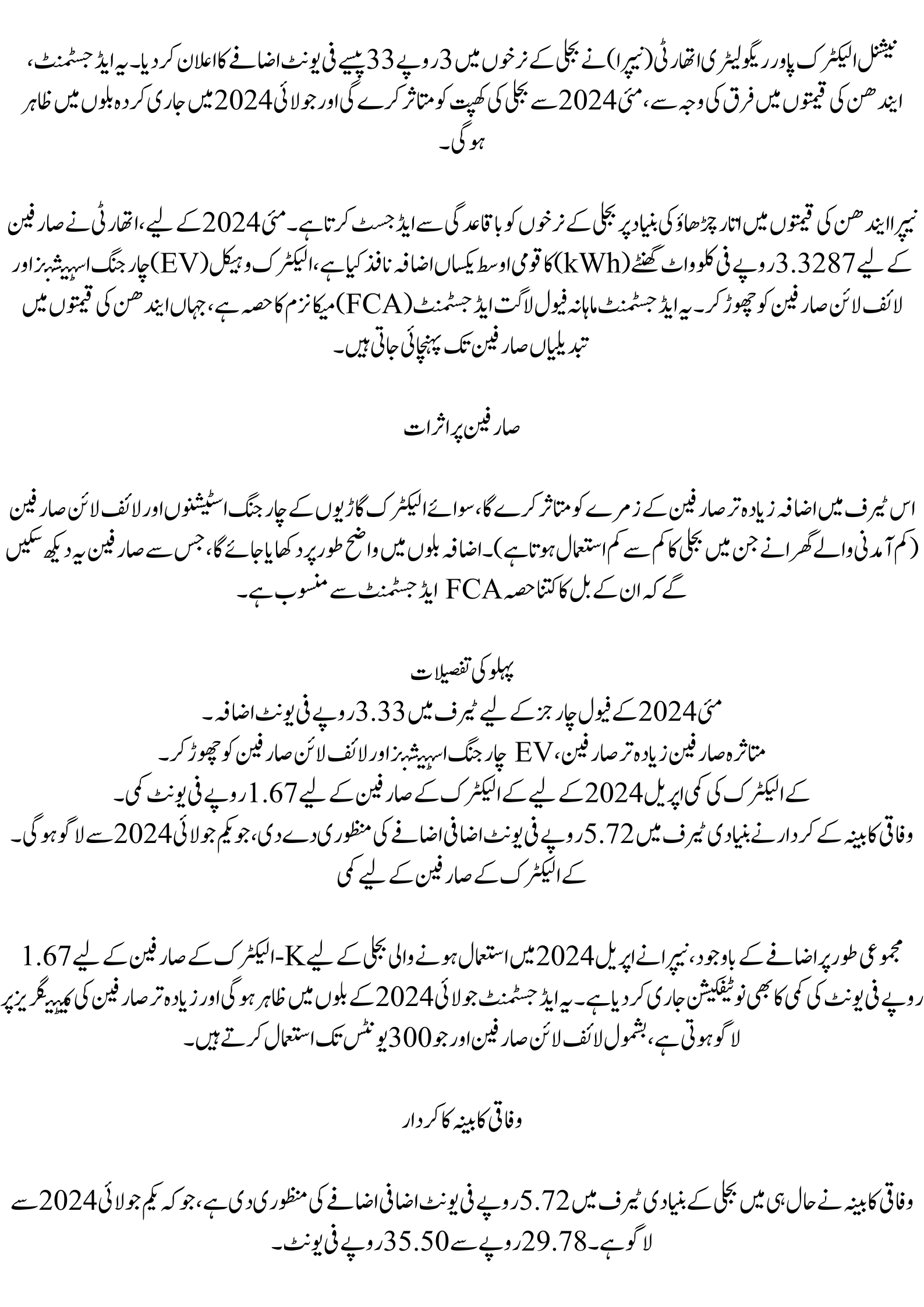Nepra Announces Tariff Increase: Details and Implications
The National Electric Power Regulatory Authority (Nepra) has announced an increase in electricity tariffs by Rs3.33 per unit. This adjustment, due to variations in fuel costs, will affect electricity consumption from May 2024 and will be reflected in bills issued in July 2024.
Nepra adjusts electricity tariffs regularly based on fluctuations in fuel costs. For May 2024, the authority has implemented a national average uniform increase of Rs3.3287 per kilowatt-hour (kWh) for consumers, excluding electric vehicle (EV) charging stations and lifeline consumers. This adjustment is part of the monthly fuel cost adjustment (FCA) mechanism, where changes in fuel prices are passed on to consumers.
Impact on Consumers
This tariff hike will impact most consumer categories, except electric vehicle charging stations and lifeline consumers (low-income households with minimal electricity usage). The increase will be clearly indicated in the bills, allowing consumers to see how much of their bill is attributed to the FCA adjustment.
| Aspect | Details |
|---|---|
| Tariff Increase | Rs3.33 per unit for May 2024 fuel charges. |
| Affected Consumers | Most consumers, excluding EV charging stations and lifeline consumers. |
| K-Electric Reduction | Rs1.67 per unit reduction for K-Electric consumers for April 2024. |
| Federal Cabinet Role | Approved an additional Rs5.72 per unit increase in the basic tariff, effective July 1, 2024. |
Reductions for K-Electric Consumers
Despite the overall increase, Nepra has also notified a reduction of Rs1.67 per unit for K-Electric consumers for electricity consumed in April 2024. This adjustment will be reflected in the July 2024 bills and applies to most consumer categories, excluding lifeline consumers and those using up to 300 units.
Federal Cabinet’s Role
The federal cabinet has recently approved an additional increase of Rs5.72 per unit in the basic electricity tariff, effective from July 1, 2024. This increase is part of the fiscal measures for the 2024-2025 financial year, raising the average basic tariff from Rs29.78 to Rs35.50 per unit.
READ MORE: Wazir-e-Azam Relief Program 5566 from PM Shahbaz Sharif
Nepra Announces Tariff Increase: Details and Implications
Implications for the Economy
The increase in electricity tariffs is expected to have several economic impacts:
Increased Financial Burden: Higher electricity costs will increase the financial strain on households and businesses.
Higher Inflation: Businesses may pass on the increased costs to consumers, potentially leading to higher inflation.
Impact on Industry: The higher production costs could affect the competitiveness of Pakistani industries.
ALSO READ: Bank AL Habib Renewable Energy Solutions
Conclusion
The recent tariff increase of Rs3.33 per unit reflects ongoing adjustments based on fuel costs, which are essential for maintaining the financial stability of the energy sector. While this increase places additional financial pressure on consumers, the reduction for K-Electric consumers offers some relief. These measures highlight the complexities of energy pricing and regulation in Pakistan.
FAQs
1. Why did Nepra increase the electricity tariff? Nepra increased the tariff to cover higher fuel costs incurred in May 2024, reflecting the increased expenses of power generation.
2. Who is affected by the tariff increase? The increase affects most consumers, excluding electric vehicle charging stations and lifeline consumers.
3. What is the impact on K-Electric consumers? K-Electric consumers will see a reduction of Rs1.67 per unit for electricity consumed in April 2024, which will be reflected in their July bills.
4. How does this affect the average electricity bill? The average electricity bill will rise due to the increased tariff, adding to the overall cost of living for consumers.


